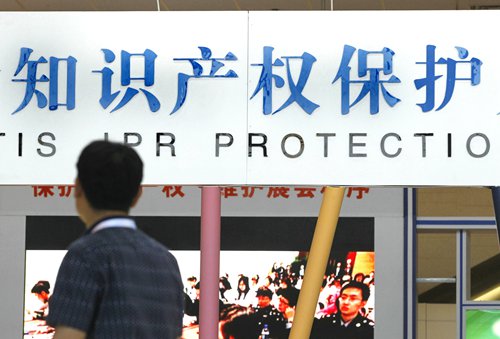China strengthens IPR protection
Export control expanded to intangibles related to national security

A visitor walks past a signboard on intellectual property rights protection during a trade fair in Beijing on May 29, 2016. Photo: IC
Top Chinese leaders held a meeting on Monday, aiming to strengthen the protection of intellectual property rights (IPR), including the administration of cross-border IPR transfers related to national security.
Xi Jinping, general secretary of the Communist Party of China (CPC) Central Committee, has stressed strengthening the protection of IPR comprehensively, the Xinhua News Agency reported on Tuesday. Xi made the remarks while presiding over a group study session of the Political Bureau of the CPC Central Committee held in Beijing on Monday.
"Over the past 40 years, China has built up a relatively sound IPR protection system out of nothing, and it has now become a major country in IPR protection. The latest meeting focused on building an upgraded version of China's IPR protection system, which shows that China is moving from a follower of international rules to a formulator," Zhang Xiaorong, director of the Beijing-based Cutting-Edge Technology Research Institute, told the Global Times on Tuesday.
During the meeting, the Chinese top leader said that China should administer the transfer of IPR related to national security in accordance with China's law, to be enforced with legitimate and effective means of restrictions.
Wang Peng, an assistant professor at the Gaoling School of Artificial Intelligence at the Renmin University of China, said that IPR transfer administration is closely linked to the export control law.
"The law is not aimed at restricting exports of goods but at protecting patents or IPR, especially intangible IPR. Take TikTok, for example: it has a huge number of algorithms, which are built on the data from a vast base of Chinese users. If TikTok was acquired by a foreign company or became a joint venture there, then there would be a risk of this data leaking onto the market, compromising its underlying technology and core content. The same is true in the medical field when it comes to sensitive genetic data," Wang told the Global Times on Tuesday.
The law, which took effect on Tuesday, imposes restrictions on the exports of military products, nuclear products, and other special-use goods deemed necessary to protect China's national security.
Zhang Huaxin, a lawyer specializing in foreign-related law based in Zhengzhou, Central China's Henan Province, told the Global Times on Tuesday that the export control law is the legal norm governing external transfers, thus transfers should be covered by the newly released export control law.
Wang noted that export controls established through the strengthened administration of IPR transfers are intended to protect China's national interests, and to better counteract an escalating technology rivalry with the US.
"If China and the US were to share close bilateral relations and strong technology exchange programs, this issue would be less relevant. Now that the US is setting more restrictions on Chinese enterprises, China will also have to adopt effective measures to protect its own interests," said Wang.
The one-year-long US-initiated technology war against China has targeted many leading companies including Huawei Technologies, ByteDance's TikTok and Tencent Holdings.
"In recent years, China's international competitiveness in advanced technology has been growing, especially in the field of the digital economy, such as 5G and algorithms of short-video platforms, which posed a threat to the US' leading position. The Trump administration, in the name of national security, imposed technology blockades and trade sanctions on China. Therefore, China has to take countermeasures for its own industrial security, of which the export control law is a means of hitting back," Hu Qimu, a senior fellow at the Sinosteel Economic Research Institute, told the Global Times.
Hu added that apart from securing the supply of core technology products, key technologies in fields where China has a global competitive advantage need to be protected from illegal and forced IP acquisition by certain countries.
The latest example was the acquisition of TikTok's US business, Hu noted.
"The law and the transfer controls are designed to adapt to future conflicts in the field of high technology. China should plan ahead by completing the construction of a legal foundation, which also shows the world the firm position and attitude of China in strictly protecting IPR in accordance with the law," said Zhang.
